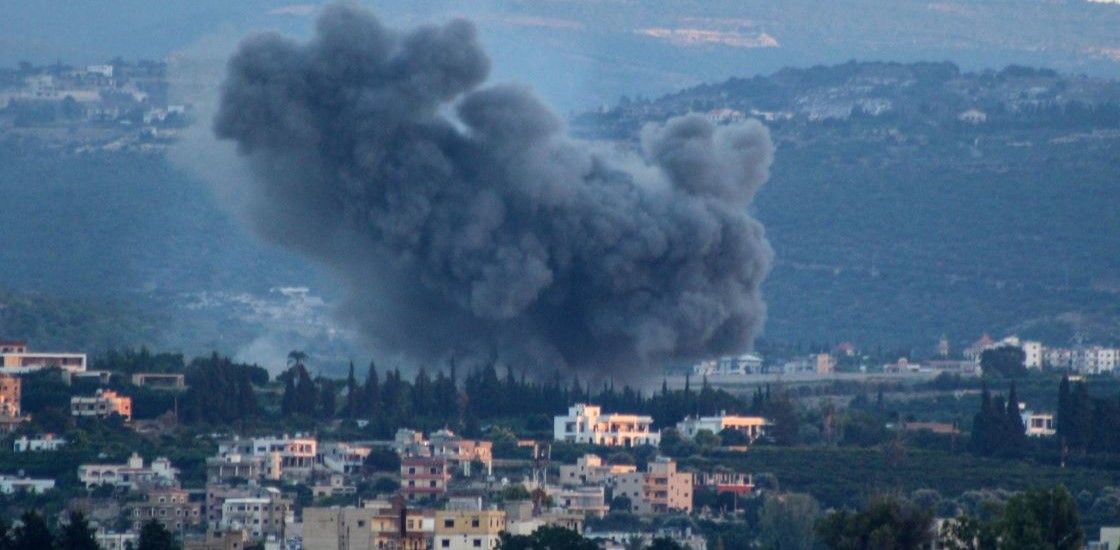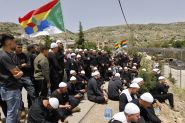- Home
- Middle East
- Yom Kippur Starts Tensely as Israel Clashes With Hezbollah

Smoke rises during Israeli strikes on villages overlooking the southern Lebanese city of Tyre on October 11, 2024. ©Kawnat Haju / AFP
Israel observed Yom Kippur, the holiest day in the Jewish calendar, on Saturday amid a firestorm of international criticism over its military offensive in Lebanon and its soldiers firing on peacekeepers.
As the holy day got under way Friday from sundown, Israel faced diplomatic backlash over what it acknowledged was a "hit" earlier in the day on a United Nations peacekeeping position in Lebanon.
Two Sri Lankan peacekeepers were hurt in the second such incident in two days, the UNIFIL mission said Friday.
The military said Israeli soldiers had responded with fire to "an immediate threat" around 50 meters from the UNIFIL post.
As Israel faced a chorus of condemnation from UN chief Antonio Guterres and Western allies, the military pledged to carry out a "thorough review."
Hezbollah meanwhile warned Israelis to stay away from Israeli army sites in residential areas in the north of the country, alleging the military "uses the homes" of locals and has military bases in residential neighborhoods.
Hezbollah has repeatedly announced it has fired rockets at areas in northern Israel, where sirens blared in multiple locations early Saturday.
'Outrage'
The UNIFIL peacekeepers have found themselves on the frontline of the Israel-Hezbollah war.
The latest incident came a day after two Indonesian soldiers were hurt when, according to UNIFIL, tank fire hit a watchtower.
Sean Clancy, the Irish military's chief of staff, said he did not believe Israel's explanation of Friday's incident.
"So from a military perspective, this is not an accidental act," said Clancy, whose country has troops in UNIFIL.
Guterres condemned the firing as "intolerable" and "a violation of international humanitarian law," while the British government said it was "appalled" by reports of the wounded.
US President Joe Biden said Friday he was "absolutely" asking Israel to stop firing at UN peacekeepers, while the French, Spanish, and Italian leaders issued a joint statement expressing "outrage."
French President Emmanuel Macron renewed his call for an end to exports of weapons used by Israel in Gaza and Lebanon, while saying the UN peacekeepers had been "deliberately targeted".
'Immediate ceasefire'
Israeli and Hezbollah forces fought along the border on Friday, with Israeli air strikes reported in the south and east of Lebanon.
It marked a tense start to Yom Kippur. From sundown on Friday until nightfall on Saturday, Israeli markets are closed, flights stopped, and public transport halted as observant Jews fast and pray on the Day of Atonement.
Diplomatic efforts to negotiate an end to the fighting in Lebanon and Gaza have so far failed, but Caretaker Prime Minister Najib Mikati said his government would ask the UN Security Council to issue a new resolution calling for a "full and immediate ceasefire."
Leaders from nine European countries around the Mediterranean Sea on Friday also called for an end to fighting in Lebanon as well as Gaza.
Mikati said that only the Lebanese military and peacekeepers should be deployed in the south of the country—the essence of existing Security Council Resolution 1701—and "Hezbollah is in agreement on this issue."
Lebanon's military said an Israeli strike on one of its positions in south Lebanon killed two of its soldiers on Friday.
Children in Gaza
Late Friday, Gaza's civil defense agency reported 30 people killed in Israeli strikes on Jabalia, north Gaza.
An AFP journalist in Gaza reported heavy artillery shelling, explosions, and gunfire Saturday further south in Gaza City's Zeitoun neighborhood.
The co-head of a Japanese atomic bomb survivors' group awarded the Nobel Peace Prize said the situation for children in Gaza reminded him of the plight of survivors after World War II.
"It's like in Japan 80 years ago," Toshiyuki Mimaki said in Tokyo.
With AFP
Read more



Comments